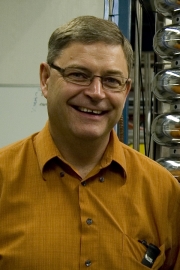Director's Corner
24 April 2008
The value of science
Today's issue features a Director's Corner from Nick Walker, Project Manager for the Global Design Effort.
What is your science worth? A question I have recently heard raised during many over-coffee discussions. The question is of course rhetorical: none of us can really answer it. But the fact that it is being asked at all is part of a reaction to the GDE management's policy to make the cost of the project a central focus of the Technical Design Phase.
Phrases like "cost consciousness", "cost awareness" and - probably of most concern - "cost reduction" have noticeably worried many groups within the ILC physics community. Fears that closed-door decisions which affect the physics scope are being made (or contemplated) by the GDE are making many people understandably nervous. I would like to reassure them that they need not worry.
So what are we doing? First, let me categorically state that no design decisions that directly affect the physics scope will be made without discussion and - more importantly - the full consensus of the community. However it is important that we prepare for such possible discussions, as part of our attempts to understand both the cost drivers of the machine and the potential design trade-offs that could lead to more cost-effective solutions.
As the project management began planning for the Engineering Design Phase, one of our cornerstones was the premise that the RDR machine design was principally sound, but the lack of maturity in the engineering design details had considerable scope for cost reduction, particularly in the areas of civil construction and conventional facilities. This has not fundamentally changed in the newly formed Technical Design Phase, but the delayed time scale and reduced resources have shifted the emphasis. Our stated priorities for Technical Design Phase 1 (TDP), ending in 2010, will now focus on successful completion of risk-mitigating R&D, such as the world-wide development of SCRF linac technology and in particular the high-gradient programme. Beam test facilities such as CesrTA at Cornell and ATF-2 and KEK and their associated research programmes and goals will also form a critical component of the goals of the TDP-1.
Despite the focus on R&D, we must still keep the linear collider design and its associated costs under constant care and attention. While we do not expect to have the resources we had originally hoped for, we can still make considerable progress by taking the time to carefully review the RDR design and its associated value estimate.
Our approach is to understand the current value estimate and machine design by working though possible alternative design scenarios. We will focus on the concept of a "minimum 200-500 GeV" design which achieves the documented physics requirements without overhead or margin. The incremental costs and benefits of adding margins will then be estimated, as will the incremental costs of the various physics options which go beyond the agreed baseline machine. In addition we will attempt to look for better cost-effective solutions for some sub-systems such as water cooling.
Until 2010 we plan to study the most promising alternative design scenarios and try to quantify the cost-performance derivatives of the "minimum" machine. With this information and the results of the critical R&D in hand, we will be in a good position to discuss cost-driven trade-offs leading to an updated baseline of the machine in 2010. The new baseline will then form the basis of more detailed engineering studies in Phase 2 of the Technical Design Phase, leading to an updated value estimate in 2012.
Of course it doesn't end there. Our goal is to be ready in 2012 to propose the ILC in light of the expected LHC results. The proposal will stand or fall on the strength of the physics case. And so we come full circle: how much is the science worth? We still don't know, but we must be in the best possible negotiating position we can be. We must be prepared to defend the costs in detail to the inevitable detailed reviews we will face, and show that we have made every reasonable effort to reduce them. This in a nutshell is what our cost reduction policy is all about.
-- Nick Walker
